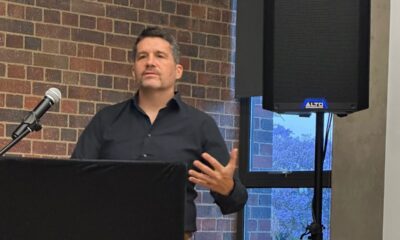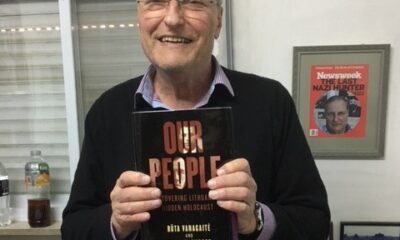
Community

A Klass act – 91 years old and still in the driver’s seat
“Drive for as long as you can,” advises 91-year-old Holocaust survivor Irene Klass of Johannesburg, who last week renewed her driver’s license.
The well-groomed, red-haired nonagenarian told the SA Jewish Report that driving gives her “independence and freedom” – two things she lacked growing up in Poland when World War II broke out.
“Driving is a necessity,” she said. “My two daughters live overseas, and I don’t want to burden people by asking for lifts, so I drive myself around.”
Not only does she manage to get from A to B, she also continues to play a regular game of bowls at her bowling club, although there aren’t many players left these days, she says.
“I also go shopping for groceries. I want to be able to do these things myself, and driving allows me to do this.”
Klass, who drives a white Nissan, concedes that she doesn’t drive as much as she used to but holds on to the fact that she can still get around at her age.
She received help from one of the volunteers at the Johannesburg Holocaust & Genocide Centre (JHGC) to apply online to renew her license, and was then taken for an obligatory eye test, which she passed.
On Wednesday, 17 August, she was taken to the Driving Licensing Testing Centre at the Midrand Gautrain Station to collect it.
“I’m pleased. One needs a driver’s license to get around, otherwise you have to rely on others, which isn’t my choice,” she said.
She posed for a picture with the staff at the testing centre, who were enamoured with her positive attitude and zest for life.
“Irene is fantastic,” said Shirley Sapire of the JHGC.
“She still speaks to children at schools about her experiences during the Holocaust, and attends our Holocaust survivor meetings at the centre, where she was an active volunteer,” Sapire said.
“She also walks every day around her complex in her retirement village, and is an inspiration.”

Born in Lodz, Poland, Klass was eight when war broke out in the country. She was in the Warsaw Ghetto, and managed to escape to live with a non-Jewish woman in Warsaw. When the war ended, she left Poland with a transport of orphans for England.
The COVID-19 pandemic was a particularly lonely time for the independent Klass, who found herself confined to her home, unable to go shopping or to the hairdresser.
She was also unable to enjoy playing Kalooki with friends and attend monthly meetings at the centre, where she would usually gather for some form of entertainment and companionship. During the lockdown, she read, watched television, and walked twice a day to pass the time. Those days brought sad memories of her youth spent in the Warsaw Ghetto, when she was one of four people confined to a tiny room, unable to go out and play.
However, Klass said she had lived through worse times than the COVID-19 pandemic, and was a survivor.
“Thankfully those pandemic days are over, and I can now drive around freely,” she said.










